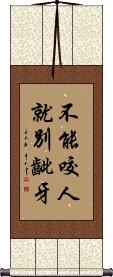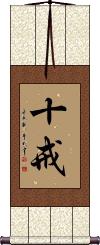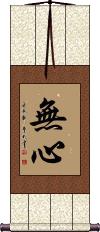Many custom options...
And formats...

Anger Not in Chinese / Japanese...
Buy an Anger Not calligraphy wall scroll here!
Personalize your custom “Anger Not” project by clicking the button next to your favorite “Anger Not” title below...
If you cannot bite, do not show your teeth
If you cannot fight, don't start one
不能咬人就别龇牙 is a Chinese proverb that literally translates as: [if you] can't bite people, don't bare [your] teeth.
Figuratively, this means: Don't show your anger if you can't do anything about the situation.
Some will also say this means “Don't start a fight that you cannot win.” Others will say it means that you must be willing to back up your words (perhaps with your fists).
Ten Commandments
十戒 means Ten Commandments or Ten Precepts.
In the Buddhist context, these are prohibitions consisting of five commandments for the layman:
1. Not to destroy life 不殺生 Pāṇātipātāveramaṇi.
2. Not to steal 不倫盜 Adinnādānāver.
3. Not to commit adultery 不婬慾 Abrahmacaryaver.
4. Not to lie 不妄語 Musāvādāver.
5. Not to take intoxicating liquor 不飮酒 Suramereyya-Majjapamādaṭṭhānāver.
The ten commandments for the monk are the preceding five plus:
6. Not to eat food outside of regulated hours 不非時食 Vikāla-Bhojanāver.
7. Not to use garlands or perfumes 不著華鬘好香塗身 Mālā- Gandha-Vilepana-Dhāraṇa-Maṇḍana-Vibhūṣanaṭṭhānā.
8. Not to sleep on high or broad beds (chastity) 不坐高廣大牀 Uccāsayanā-Mahāsayanā.
9. Not to take part in singing, dancing, musical or theatrical performances 不歌舞倡伎不往觀聽 Nacca-Gīta-Vādita-Visūkadassanāver.
10. To refrain from acquiring uncoined or coined gold, or silver, or jewels 不得捉錢金銀寶物 Jātarūpa-Rajata-Paṭīggahaṇāver.
These original Buddhist commandments date back to about 2500 years ago. The English definitions above are followed by Chinese characters and original Pali pronunciation.
Under the Māhayāna Buddhism, these ten commands for the monk were changed, to accord with the new environment of the monk, to the following: not to kill, not to steal, to avoid all unchastity, not to lie, not to slander, not to insult, not to chatter, not to covet, not to give way to anger, to harbor no skepticism.
No Mind / Mushin
In Japanese, 無心 means innocent or without knowledge of good and evil. It literally means “without mind.”
無心 is one of the five spirits of the warrior (budo) and is often used as a Japanese martial arts tenet. Under that context, places such as the Budo Dojo define it this way: “No mind, a mind without ego. A mind like a mirror which reflects and dos not judge.” The original term was “mushin no shin,” meaning “mind of no mind.” It is a state of mind without fear, anger, or anxiety. Mushin is often described by the phrase “Mizu no Kokoro,” which means “mind like water.” The phrase is a metaphor describing the pond that clearly reflects its surroundings when calm but whose images are obscured once a pebble is dropped into its waters.
This has a good meaning in conjunction with Chan / Zen Buddhism in Japan. However, out of that context, it means mindlessness or absent-mindedness. To non-Buddhists in China, this is associated with doing something without thinking.
In Korean, this usually means indifference.
Use caution and know your audience before ordering this selection.
More info: Wikipedia: Mushin
Not the results for anger not that you were looking for?
Below are some entries from our dictionary that may match your anger not search...
| Characters If shown, 2nd row is Simp. Chinese |
Pronunciation Romanization |
Simple Dictionary Definition |
十戒 see styles |
shí jiè shi2 jie4 shih chieh jukkai じゅっかい |
More info & calligraphy: Ten Commandments(1) (Buddhist term) the 10 precepts; (2) Ten Commandments; Decalogue; Decalog; (surname) Jukkai Śikṣāpada. The ten prohibitions (in Pāli form) consist of five commandments for the layman: (1) not to destroy life 不殺生 pāṇātipātāveramaṇi; (2) not to steal 不倫盜 adinnādānāver; (3) not to commit adultery 不婬慾 abrahmacaryaver.; (4) not to lie 不妄語musāvādāver.; (5) not to take intoxicating liquor 不飮酒 suramereyya-majjapamādaṭṭhānāver. Eight special commandments for laymen consist of the preceding five plus: (6) not to eat food out of regulated hours 不非時食 vikāla-bhojanāver.; (7) not to use garlands or perfumes 不著華鬘好香塗身 mālā- gandha-vilepana-dhāraṇa-maṇḍana-vibhūṣanaṭṭhānā; (8) not to sleep on high or broad beds (chastity) 不坐高廣大牀 uccāsayanā-mahāsayanā. The ten commandments for the monk are the preceding eight plus: (9) not to take part in singing, dancing, musical or theatrical performances, not to see or listen to such 不歌舞倡伎不往觀聽 nacca-gīta-vādita-visūkadassanāver.; (10) to refrain from acquiring uncoined or coined gold, or silver, or jewels 不得捉錢金銀寶物 jātarūpa-rajata-paṭīggahaṇāver. Under the Māhayāna these ten commands for the monk were changed, to accord with the new environment of the monk, to the following: not to kill, not to steal, to avoid all unchastity, not to lie, not to slander, not to insult, not to chatter, not to covet, not to give way to anger, to harbour no scepticism. |
とは see styles |
toha とは |
(exp,prt) (1) (See と言うのは・というのは・2) indicates word or phrase being defined; (exp,prt) (2) (indicates contrast or adds emphasis to a negative statement) (See と・4) used for quoting (thoughts, speech, etc.); (exp,prt) (3) (more emphatic than と) (See と・3) with; (exp,prt) (4) (with neg. verb) (not) as much as; (not) so much as; (exp,prt) (5) (indicates surprise, disbelief, anger, etc.; sometimes at sentence end) the fact that; to think that; such a thing as; (personal name) Doha |
五德 see styles |
wǔ dé wu3 de2 wu te gotoku |
The five virtues, of which there are various definitions. The five virtues required in a confessor at the annual confessional ending the rainy retreat are: freedom from predilections, from anger, from fear, not easily deceived, discernment of shirkers of confession. Another group is the five virtues for a nurse of the sick, and there are others. |
十惡 十恶 see styles |
shí è shi2 e4 shih o jūaku |
Daśākuśala. The ten "not right" or evil things are killing, stealing, adultery, lying, double-tongue, coarse language, filthy language, covetousness, anger, perverted views; these produce the ten resultant evils 十惡業 (道) Cf. 十善; 十戒. |
遷怒 迁怒 see styles |
qiān nù qian1 nu4 ch`ien nu chien nu |
to take one's anger out on sb (who does not deserve it) |
瞋不受悔 see styles |
chēn bù shòu huǐ chen1 bu4 shou4 hui3 ch`en pu shou hui chen pu shou hui shin fujukai |
to hold one's anger and not accept another's apologies |
瞋不受悔戒 see styles |
chēn bù shòu huǐ jiè chen1 bu4 shou4 hui3 jie4 ch`en pu shou hui chieh chen pu shou hui chieh shin fujukai ke |
precept forbidding the holding of anger and not accepting the apologies of others |
瞋心不受悔 see styles |
chēn xīn bù shòu huǐ chen1 xin1 bu4 shou4 hui3 ch`en hsin pu shou hui chen hsin pu shou hui shinshin fujuke |
holding on to one's anger and not accepting another person's repentance |
腫れ物扱い see styles |
haremonoatsukai はれものあつかい |
(noun/participle) treating (someone) with great caution (so as not to anger or upset them); handling with kid gloves; treating gingerly |
The following table may be helpful for those studying Chinese or Japanese...
| Title | Characters | Romaji (Romanized Japanese) | Various forms of Romanized Chinese | |
| If you cannot bite, do not show your teeth | 不能咬人就別齜牙 不能咬人就别龇牙 | bù néng yǎo rén jiù bié zī yá bu4 neng2 yao3 ren2 jiu4 bie2 zi1 ya2 bu neng yao ren jiu bie zi ya bunengyaorenjiubieziya | pu neng yao jen chiu pieh tzu ya | |
| Ten Commandments | 十戒 | jukkai / jukai | shí jiè / shi2 jie4 / shi jie / shijie | shih chieh / shihchieh |
| No Mind Mushin | 無心 无心 | mu shin / mushin | wú xīn / wu2 xin1 / wu xin / wuxin | wu hsin / wuhsin |
| In some entries above you will see that characters have different versions above and below a line. In these cases, the characters above the line are Traditional Chinese, while the ones below are Simplified Chinese. | ||||
Successful Chinese Character and Japanese Kanji calligraphy searches within the last few hours...






